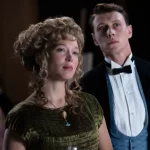The Courier: Blown Cover, by Jim Rohner

It’s 1961, the Cold War is at its peak, and, as The Courier’s opening titles remind us, both America and the Soviet Union stand poised on the brink of mutually assured destruction thanks to a buildup in nuclear arms. The constant fear of a potential world war brought about by the whims of “an impulsive, chaotic man” such as Nikita Khrushchev has weighed on Oleg Penkovsky (Merab Ninidze) so oppressively that he is desperate to defect, going so far as to approach unknown Americans on the streets of Moscow to beg them to deliver a message to their embassy.
Penkovsky’s message does make its way back to the CIA, though they’re reluctant to directly intervene thanks to intense scrutiny they’ve already attracted in Russia after “the Popov situation” (basically, a high-ranking Soviety military intelligence officer turned spy for the CIA was outed and executed the previous year). Unable to resist the lure of the intel from a member of Khrushchev’s inner circle, a CIA operative working in London, Emily Donovan (Rachel Brosnahan), and a British intelligence agent, Dickie Franks (Angus Wright), decide to take a different approach: since they can’t get a professional spy or operative inside the Iron Curtain, why not try for an amateur deceiver?
Enter Greville Wynne (Benedict Cumberbatch) whose name and mustache are the only noteworthy things about him (even his so-called “drinking problem” is more of an asset for blending in with hard-drinking Russians than it is a distinctive character trait). Greville’s success as a salesman at home (he’s managed to sell his wife, Sheila (Jessie Buckley), on the idea of taking him back after an affair) is equalled by his success as a salesman in other Communist countries, so the Crown enlists him to fly to Moscow as an amateur spy; after all, what is a salesman if not someone who can successfully alter their expressions, demeanor, and ethics in order to make their target believe in what is often an illusion?
In a way, the illusion that Greville has to sell is one of reality: that of an everyman. Benedict Cumberbatch is more engaging as an ordinary character in extraordinary circumstances than he is as an extraordinary character in contextually ordinary circumstances – Doctor Strange, Sherlock Holmes, Smaug, etc. – and he shines in The Courier in how utterly unspectacular he makes Greville seem. The titular character is neither recruited for nor prone to melodramatics or exuberance, so the gravity of Greville’s situation plays out almost entirely in subtle balance on Cumberbatch’s face as he suppresses panic and paranoia to continuously project the illusion of normalcy. Slight vocal pauses, shifting glances, and twitches of the lips are often the only indicators of doubt and fear that Cumberbatch allows Greville to express while in the field, making his imminent outbursts at home all the more unnerving and powerful.
Before ultimately settling on a March release due to COVID, The Courier was last intended for an October 2020 release and it wouldn’t be a stretch to imagine that the distributors were hopeful that a release so late in the calendar year would put Cumberbatch at the forefront of Academy members’ minds when it came to leading man awards consideration. That approach wouldn’t be absurd either since The Courier is Greville Wynne’s film and is thus, Benedict Cumberbatch’s film, and if The Courier deserves elevation for any reason, it’s because of its leading man.
There are notable elements of The Courier–Dominic Cooke, with his extensive theater background, coaxes impressive performances out of just about everyone and Sean Bobbit’s cinematography, with its furtive glances cast amongst the dreary, grey fog of Iron Curtain paranoia, is reminiscent of Hoyt van Hoytema’s work on the exceptional Cold War thriller Tinker Tailor Soldier Spy–but admirable technical craft aside, The Courier plays out exactly as you’d expect a Cold War thriller to do, with little in the way of surprise or tension unless you’ve never once been to a history class or are entirely unfamiliar with how the Soviets dealt with dissenters and spies. It’s admirable that this largely unheralded and true story of an average salesman turned spy is being told to the world, but The Courier doesn’t demand attention in one way or another and, in a cinematic landscape oversaturated with content providers pushing out original yet easily digestible content, it’s likely to be as engaging and imminently forgettable as Greville Wynn was meant to be.


























